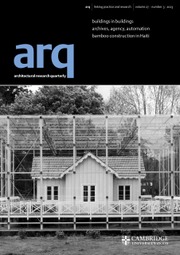No CrossRef data available.
Article contents
Our architectural conception of space
Published online by Cambridge University Press: 26 September 2001
Abstract
This is a translation of the inaugural lecture Asplund gave as Professor of Architecture at Stockholm's Tekniska Högskolan in 1931.E. G. Asplund. ‘Var arkitektoniska rumsuppfattning’, Byggmästeren: Arkitektupplagan 1931, pp.203—210. There is a photograph of Asplund giving this talk, in Christina Engfors' book E. G. Asplund: arkitekt, Arkitektur Forlag, Stockholm, 1990, p.69. Asplund used the opportunity to affirm his support for the ‘new conception of space’ in contemporary architecture. His acknowledgement of the influence of Le Corbusier is expected; but the emphasis on Spengler's The Decline of the West,Oswald Spengler. Der Untergang des Abendlandes, (Vol.1) Gestalt und Wirklichkeit (1918), (Vol.2) Welthistorische Perspektiven (1922), C. H. Beck'sche Verlagsbuchhandlung, Munchen, translated by C. F. Atkinson as The Decline of the West, (Vol.1) Form and Actuality (1926), (Vol.2) Perspectives of World-History (1928), George Allen & Unwin, London.Spengler's ‘theory of historical cycles’ was broadly dismissed as unsound by contemporary academic historians (cf. R. G. Collingwood — ‘Oswald Spengler and the Theory of Historical Cycles’, in Antiquity, 1927), but his use of the generic spatial organizations evident in architectures of the past, as evidence of the ‘culture souls’ of the civilizations that produced them, retains interest from an architect's point of view. and to its identification of ‘infinite space’ as the ‘prime symbol’ of Western culture, suggests that maybe Spengler's work had more influence on architects in Europe during the 1920s than is generally recognized.
- Type
- document
- Information
- Copyright
- © 2001 Cambridge University Press




